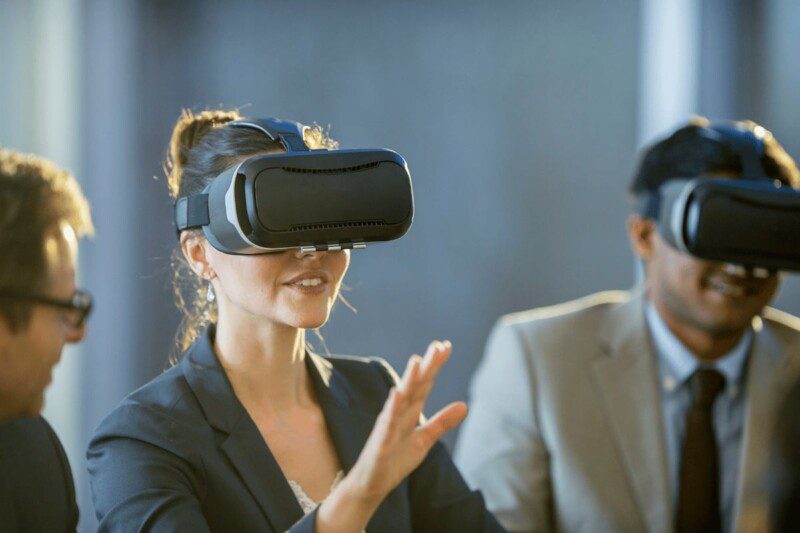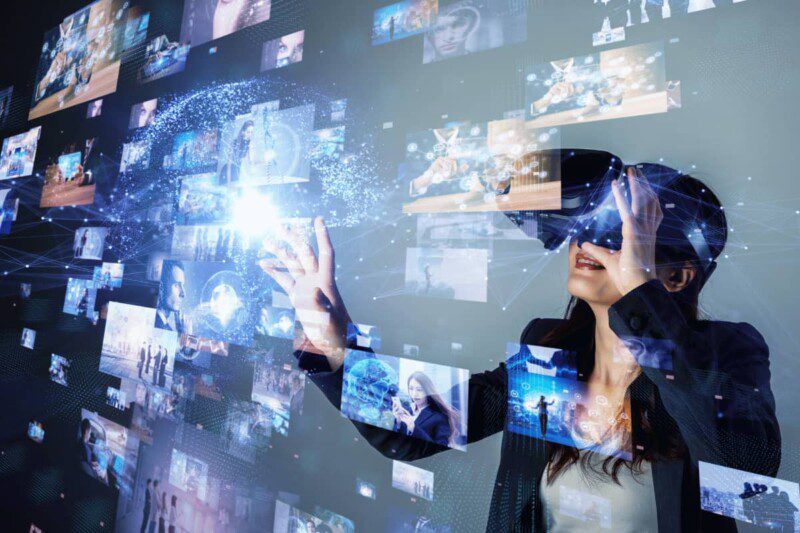The emergence of virtual reality as a mainstream technology has completely revolutionized the way businesses operate in recent times.
What used to be limited to special projects conducted by tech-savvy companies is now being used across almost every industry, ranging from healthcare and engineering to finance and education. By utilizing immersive virtual environments for data analysis, project collaboration, training initiatives, and even customer service management, businesses are experiencing increased efficiency in their operations that would have been unforeseen mere years ago before advancements in VR technology began taking off.
Let’s take a look at some of the ways virtual reality is propelling modern business forward into more seamless and efficient operating models.
Virtual reality
Virtual reality is quickly becoming a game-changing technology for the way businesses operate across all industries. With its use, companies can tap into innovative solutions when managing their internal and external operations.
This revolutionary technology allows even the most mundane of tasks to be completed with unprecedented speed, accuracy, and revenue-generating potential. With virtual reality continuing to evolve, it looks certain that soon there will be a few aspects of business operations that the technology won’t have the capability of improving or replacing entirely. Companies should stay ahead of the curve by recognizing the potential power virtual reality provides and implementing these opportunities as soon as possible.
A VR consulting company can be invaluable for wise businesses, as it helps them understand the best approaches and strategies to take when leveraging virtual reality technology. Plus, with the right team, businesses can develop their own virtual reality solutions that cater directly to their individual needs.
Increased productivity
VR is revolutionizing the way modern businesses operate. By putting employees in an immersive environment, they can collaborate more effectively and efficiently on projects.
Utilizing virtual reality, teams now have access to detailed simulations of work processes within a lifelike three-dimensional space. This allows staff members to get a better visual understanding of business operations and encourages them to think outside the box while also increasing communication among co-workers.
Overall, VR offers businesses the ability to not only increase productivity but also enhance employee engagement and collaboration. Keep in mind that these immersive experiences can also be used to train employees on new processes and technologies, offering an accelerated learning process for those already familiar with VR.
Visualizing complex data
It can help to make complex data sets easier to navigate, allowing businesses to gain insight into their operations from a variety of perspectives. By transporting decision-makers into an immersive visual environment, VR technology enables them to view data in 3D and follow trends as they unfold. This can make the difficult task of understanding large amounts of information much more manageable, and help organizations identify improvement opportunities over time.
What’s more, using VR to visualize complex data sets could potentially open up the potential for real-time analysis and speedy decision-making processes. With its capacity to provide new ways of understanding nearly any kind of data set, virtual reality has become an invaluable asset when it comes to modern business operations.

Training and teaching new skills
Technology has revolutionized the way businesses operate in the modern age. One of its most beneficial uses is for training and teaching new skills. By immersing users directly into virtual environments, VR allows them to practice skills in a realistic, risk-free space, addressing potential dangers or mistakes made before entering real-life scenarios for training.
For industries like manufacturing, medical or military fields where precision and accuracy are of utmost importance, VR can drastically enhance the learning process by allowing for sensory experiences that replicate real life with great detail, such as controlling machinery or understanding tactical planning on digital battlefields.
With virtual reality technology, businesses can provide their staff with much more efficient and effective ways of learning new skills that reduce errors by presenting scenarios easily and accurately – saving time and money in the long run.
Marketing campaigns and customer engagement
Many companies now use immersive virtual environments to show off their offerings in a captivating way that was not possible before. Companies are crafting elaborate VR experiences tailored to appeal to their target audience, allowing customers to feel like they are part of the action instead of just viewing it on a flat screen.
Customers can “try out” new products and services without leaving the comfort of their own homes, giving them an interactive and engaging experience that traditional marketing methods cannot match.
This exciting new technology has opened up many possibilities and completely revolutionized how businesses compete in the marketplace. Plus, it’s cost-effective, efficient, and sustainable. VR technology has revolutionized many aspects of the modern business world by offering new ways.
The potential of virtual reality
The technology has the potential of revolutionizing modern business operations by providing organizations with a platform to explore opportunities and solutions to various challenges. Such as utilizing a variety of data sources, creating new products or services, improving workplace safety, and recruiting new talent.
Unlike traditional processes which involve conference calls and video conferences, virtual reality gives businesses the ability to interact with their environment in three dimensions and use technology to build collaborative spaces through immersive experiences.
As VR continues to mature, it will play an even greater role in enhancing productivity, efficiency, and decision-making in all aspects of modern business operations. Not to mention, the applications of VR in marketing and customer engagement. With new technology constantly being developed to further expand virtual reality capabilities, it is clear that the potential for endless possibilities is within reach.
Conclusion
In conclusion, Virtual Reality has the potential to revolutionize how we manage business operations.
Whether it’s enabling employees to:
- Collaborate more effectively in an immersive environment,
- Helping executives make data-driven decisions quickly and easily,
- Allowing organizations to create interactive training platforms, or
- Providing customers with an engaging shopping experience.
So, virtual reality offers up a whole host of possibilities for businesses.
As this technology continues to become more prevalent in society, we’re now beginning to understand just how powerful and effective it really is when used in the corporate landscape. From cutting operational costs to increasing productivity and engagement – companies that embrace virtual reality now will have a leg up on the competition for years to come.



